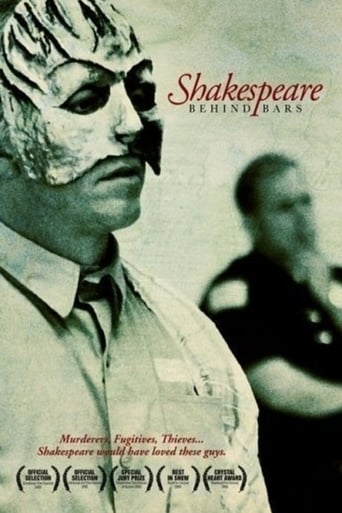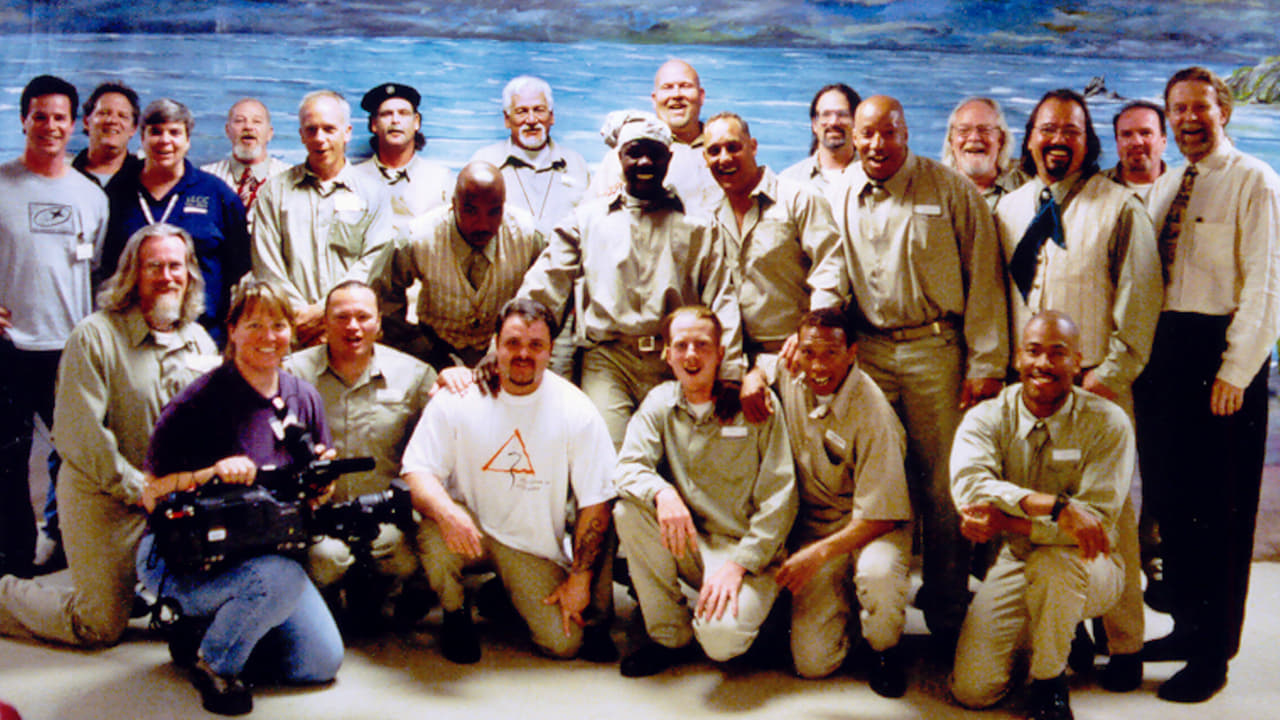raymond-15
If you're going to put on a play within the prison walls why not go for the top playwright William Shakespeare? And if you are going to choose your cast from a whole lot of criminals serving long sentences for the most heinous crimes, you can be sure there will be plenty of time for rehearsals. In a Kentucky Correctional Prison a courageous project such as this was undertaken with amazing results. This film shows how it was all done
.the casting
.the rehearsals
.the set and costumes
and the final presentation of Shakespeare's play "The Tempest." It had not occurred to me before but there is an analogy between the setting of the play and the correctional prison. In the play the ship-wrecked characters are confined to an island with no contact with the outside world. Prison life too is much like that.With a simple painted back drop of a surrounding seascape, the characters in a most pleasing assortment of costumes bellow out their lines to an approving audience, may be not quite as Shakespeare intended but with good heart and true sincerity for sure.More interesting than the play itself were the little cameos of each man behind his character. One inmate saw the play as a lesson in forgiveness another as a redemption of his sins. It was quite moving to see the men wipe away a tear as they spoke of murder, shooting and strangulation. One had the feeling that they would all like to wind back the clock and reconsider their brutal actions. However (as someone said) the past was past, and the present was the beginning of a new future. At least the play gave temporary relief from the depressing thoughts of past events.The prison authorities should be applauded for allowing the play to take place. Such an event would put Kentucky on the map and hopefully other prisons might follow their good example. It seems to me that everyone stands to benefit
not only the Kentucky prison but the prisoners themselves who need to find new confidence and self esteem and be prepared for the day when they go out on parole.
Patrick_Waggett
Shakespeare Behind Bars was a strangely uplifting documentary despite its content. Convicts at Luther Luckett Correctional Complex in LaGrange, Kentucky who have raped, murdered etc
and surrounded by bad people in an obviously depressing environment find something they genuinely enjoy and can become important, popular and celebrated in acting. There are paralleled themes to 'Shawshank Redemption' with their institutionalised natures and search for forgives and redemption for their past lives. As we follow a generous, non judgemental Director, who gives up his time each year to Direct certain inmates in a chosen play by William Shakespeare (this time around, the 'Tempest', that was cleverly portrayed with the inmates who could relate to it so much with its penetrating focus on forgiveness and redemption in which they confide and relate to) we are introduced to each actor in formal interviews that are nicely paced with break up footage of them rehearsing. Each actor has their own story and tell of their regrets and reasons why they are there in emotional fashion with melancholic music over each in a traditional documentary sense. The strongest and most respected inmate (it would seem) is Sammie. The Director appears to immediately realise who the most interesting inmates were in Sammie (and later, Hal) and allows a longer, more in depth observation into the man and his personality. His presence is felt on screen and his personal revelations come as a shock to the audience, but give him such appeal in his emotional personality and a particular empathy is felt toward him. Hal is the same at the beginning of the film. He has other things that he does to pass the time that's shown as a comfortable hobby as it were in running an on site news broadcast programme. Again, through personal interviews and revelations self admitted by Hal (and nicely shot cutaways of Hal's body language, not the close-ups of his uncertain hand movement not only observed with him but others as well,) in particular his heart felt story about being unsure and scared of his true sexuality in a society that purely would not accept him as a homosexual until later on in the film where he is shown to be quite snide and rude to other inmates involved in the play as though he deems himself above all of them, in particular to Ron who already has a frustrating temperament in his acting. The relationship between all of the inmates involved in the play is shown as one of respect and unity to achieve something great for themselves. With nice (if not clichéd) motions of time passing by with titles etc
everything seems to go right in the first act, and then on the build up to the public performance, things predictably go wrong. An induction of one of the actors being transferred and his character being replaced by a younger, newer inmate gives the narrative a nice subplot into someone who promises big, but in the end disappoints all and does not live up to their expectation. One inmate in particular (Big-G) welcomes the new inmate actor (Rick) with an evident will to nurture him into their beloved practise and hopefully become a good role model. The film seems to capture each inmates passion so well with something the audience can relate to especially when Rick is put in the 'Hole' for getting new tattoos (something nicely hinted upon earlier in the film when the warden stops a random inmate in the yard and asks him when he got a tattoo that's on his arm and we learn it's a punishable offence in the facility) and Big-G's disappointment is understood deeply. A happy ending? It all looks great when they are performing successfully (even being invited to perform elsewhere) and a sense of real unity echoes around them, but in the end, the film brings everyone back down to earth that this is short lived and everything they ever had or wanted was and will always be taken away from them. It is back to prison to pay for their crimes and no matter what redemption they seek in acting these plays, they won't be free men, their proud performances and recognition is undermined by the fact that they are the lowest of the low criminals and a nice halt in the uplifting music that plays in a shot of a long corridor that coincides with the lights turning off and doors shutting is a powerful image of their oppression. The Director seemed to be aware he was watching likable people in the documentary by given additional information at the end of the film into each actors future from the end of the film about where they are and what's happening to them now.
CDubrock
I saw this film in 2005 at the River's Edge Film Festival in Paducah, Kentucky. I was moved by its depth and the incredible candor of the subjects. It was at once about the Shakespeare program and about the actors, each a convicted felon. Most of the senior members of the troupe were hard-timers who had been performing in the program for years. The American public has a tendency to think of the prison population as numbers or tax liabilities or monsters. This film revealed that regardless of their past, prisoners are actually living, breathing human beings that still have real emotions and real ideas. This is not a film about prisons. This is a film about people.
Elijah_Chandler
My father was the warden of the prison (he is retired now) showcased in this documentary and I've grown up around the prison life, so perhaps my views will be totally different from everyone else who watches this movie. I will say this, the filmmakers who brought us this 93-minute miracle are fantastic artists and even better people. They were brave enough to A) Show up and tell this story, B) Get inside these inmates minds and hearts, and C) Do all of this responsibly. Responsible to their art and, more importantly, responsible to the inmates and staff of Luther Luckett Correctional Complex. They should be commended without end for this work. To take 170 hours, yes HOURS, of footage and be able to cut and whittle it down to 93 riveting minutes is nothing short of extraordinary and they have my utmost respect.I saw this film under circumstances that only a very, very few were able to see it. I was at the inmate screening. I was in the same room with these men as they watched their hearts being poured out on screen. I saw men crying on television crying in the chair in front of me and let me tell you, it was a very profound experience. These men have committed horrendous crimes in some cases, yet have found ways to try to redeem themselves, even if they view themselves as unredeemable. How many of us have the courage to do this? How many people could do what they have done in such a harsh environment? To see them react to the film was an experience I am eternally grateful for, and I will never forget that. I thank the men who allowed me this glimpse into their lives, I thank my father for making ALL of this possible, and I thank Philomath Films for taking the time to pour their blood, sweat, soul, and tears into this project.This movie will change everything you think you know about prison life, and the inmates held within it. 'Oz' is not real, television is not real. 'Shakespeare Behind Bars' is.


 AD
AD



